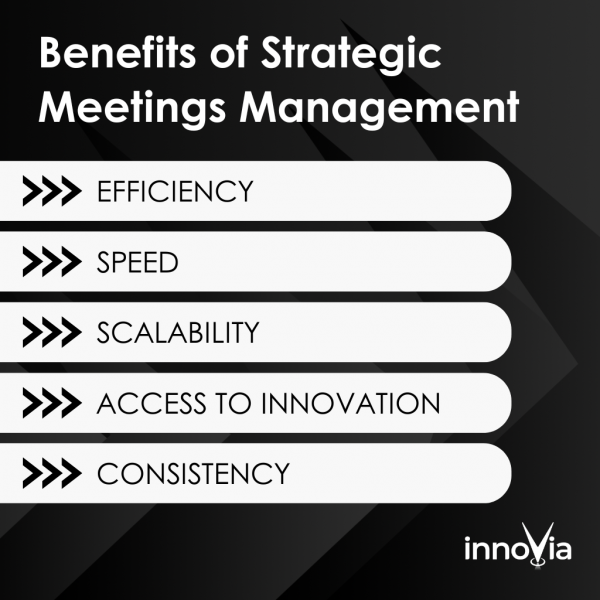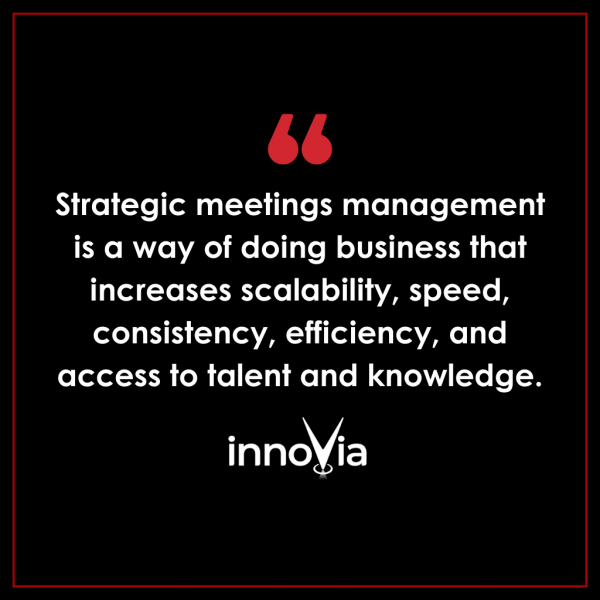Most event stakeholders suffer from internal inconsistencies, meaning they have no company-wide best practices or accountability protocols.
Instead, they achieve “efficiency” by having different employees plan different events in different ways — a recipe for disaster.
If different departments speak different operational languages, everyone wastes time trying to understand one another. If your operations managers buy from different vendors, price leveraging is nearly impossible. And if one department has less volume than all the rest, a high-priority event may get put on the back burner, creating a bottleneck for the entire company.
Planning an event without cross-departmental best practices is like throwing a bunch of swimmers into a pool without swim lanes. Sure, they’ll all finish the race, but if every employee has their own way of operating, coordinating, hiring, and working with other stakeholders, they’ll cross wires and bump heads along the way, leading to inconsistent events.
You need Strategic Meetings Management (SMM). Strategic meetings management sets consistent protocols and makes them available to anyone within an organization looking to procure a meeting, so you eliminate friction, leverage pricing, and produce events that run seamlessly.
My Introduction to Strategic Meetings Management
I was introduced to strategic meetings management shortly after learning about strategic sourcing (aka category management) and strategic account management, which taught me how to design strong relationships between customers and vendors.
At the time, I oversaw a large group of salespeople who had key accounts with our organization, and I sought a better way to manage those relationships. I thought that if I could create a smoother sales process, it would mean more profit for us and more issue resolution for our accounts.
My first large key account requested that we move our relationship into the strategic sourcing department. Initially, there was apprehension on both sides of the relationship. Everyone liked the boundaries of our working relationship, and no one wanted to mess with the proverbial sandbox.
However, because of my strategic account management training, I knew the change would be a mutually beneficial opportunity. After I embraced it, others followed.
My department worked with the meeting-planning department on all aspects of their upcoming events (logistics, resources, etc.). Our work became event-focused instead of department-focused. I split my relationship evenly between representatives from the sourcing department, the head of the meetings department, and the event planners. Together, we established best practices, and the quality of our events skyrocketed.
Soon after, I learned about strategic meetings management — a new program within the strategic sourcing program. Involving meeting departments with strategic sourcing was a novel idea at the time, only about 20 years ago. It may not have been tried and true, but it was full of potential, and I quickly became an SMM evangelist.
What Is Strategic Meetings Management?
Strategic meetings management isn’t a trademarked term, and it doesn’t have an official definition.
But in my own words, strategic meetings management is a way of doing business that increases scalability, speed, consistency, efficiency, and access to talent and knowledge. It’s a customizable process with no CapEx required after implementation that aligns employees and vendors with cross-departmental policies, reducing risk and increasing confidentiality.
There’s no official SMM organization and no one tried-and-true implementation method. However, some unofficial organizations and experts have created SMM documentation and training. (I’ll direct you to some great ones later.)

How Strategic Meetings Management Helps Event Stakeholders
Once you implement a strategic meetings management program, your event stakeholders enjoy the following benefits:
1. Efficiency
As the saying goes, less vendors is better vendors. Having all your salespeople buy from a short list of three or four company-preferred vendors makes it easier to resolve issues, leverage pricing, and forge strong working relationships.
With only “one throat to choke,” you streamline the event planning process from conception to conclusion, eliminating wasted time. Questions like “How do I order this?” and “Who do I call?” get eliminated if you document processes and make them accessible to everyone.
2. Speed
Because strategic meetings management is efficient, it’s fast — and in event planning, speed-to-market relates heavily to price.
If a business wants to host an event to promote a product, for example, reducing the time it takes to plan that event means the business can host more events and promote more products. More events means greater product awareness, which results in increased profits.
Quite literally, time is money.
3. Scalability
Without strong, established processes, planning and processing an event takes much longer, which limits the number of events you can do. With strategic meetings management, you can produce more events with the same effort.
This doesn’t just apply to audio-visual production. SMM can scale anything within meetings management, from selecting hotels to choosing logistics companies.
4. Access to Innovation
Having strong partnerships with vendors is an important (but often overlooked) tenet of lasting growth.
Maintaining quality relationships with vendors means receiving access to insider knowledge you can’t find anywhere else. Providing your vendors with a fostering environment means they achieve more growth. More growth means greater power to provide you with talent and new insights about industry trends. These innovations help you succeed, which helps your vendor succeed, and the cycle continues.
Over time, they become more than a vendor — they become a trusted advisor.
5. Consistency
Buying transactionally leads to the highest variance in outcome — you’ll get a different result every time, whether that be different pricing, different quality of service, a different contract you need to sign and adhere to, etc.
Strategic meetings management solves this issue by outlining protocols that lead to the most consistent experience. You won’t always get the lowest price, but you will get price consistency, which is essential for planning, budgeting, and speed.

How You Can Implement Strategic Meetings Management
Strategic meetings management solidifies every event planning process — communications, authorizations, vendor selection, contracting strategy, negotiations, data monitoring, goal measurement, and more — so your stakeholders enjoy consistent, predictable events. With strategic meetings management, your event in Hong Kong ends up identical to your event in Houston, from planning to pricing to production.
Implementing SMM can be costly. It requires wide-ranging behavioral change, which can be difficult to accomplish; it’s much easier to change software or a vendor than to revamp your event planning process from the ground up. However, the long-term success, efficiency, and profitability that result from this approach are worth the costly implementation period.
Bringing in an experienced guide can make the changeover as smooth as possible. I recommend Therese Jardine of Strategic Event Procurement, who will appear on my podcast very soon, and Betsy Bondurant of Bondurant Consulting.






